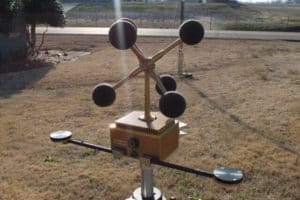Two government-developed sensors are working together to increase the security of deployed Soldiers.
The Firefly and Serenity sensors employ government developed algorithms, software, and hardware to locate hostile fire around a base.
The technology, a joint effort between the Army Aviation Research, Development and
Engineering Center, or AMRDEC, and the Army Research Lab, referred to as ARL, has been under development for more than a decade.
“Once the Serenity locates hostile fire, the system then communicates the shooter point of origin in Universal Transverse Mecator coordinates to the tactical Operations Center using cursor-on-target protocol,” said Timothy Edwards, chief scientist with Force Protection Technologies. “Threat cueing and classification information allows the Soldier manning an AMRDEC-developed Containerized Weapon System or other defensive system to give prompt attention to the hostile threat,” he said.
SERENITY PAYLOAD
 The Serenity payload, developed jointly by AMRDEC and ARL, has been deployed to theater in the Middle East with additional deployments planned for other areas of the world.
The Serenity payload, developed jointly by AMRDEC and ARL, has been deployed to theater in the Middle East with additional deployments planned for other areas of the world.
The Serenity payload provides 360-degree hemispherical surveillance coverage, has self-contained power and is deployed on the Lockheed Martin Persistent Threat Detection System aerostat, or PTDS.
The Serenity payload includes the FireFly acoustic sensor coupled with an electro optical array, or EO, of cameras, according to Lamar Auman, AMRDEC associate director for Modeling and Simulation.
“The Serenity system allows operators to see attacks as they happen, or access digital video recorder forensic playback if necessary,” Auman said. “Serenity’s combined EO and acoustic capabilities provide the Army with the eyes and ears need to detect rocket and mortar flash-boom events at launch and detonation. This capability combined with complex sensor data fusion software; make the Serenity Payload uniquely suited to protect forward-deployed bases.”
Serenity’s net-centric autonomous cueing capability can be used to direct the PTDS payload sensor to a specific location or focus the attention of a Containerized Weapon System, or CWS, operator to a potential threat. This capability greatly increases the probability of hostile threat detection and allows the operator to concentrate on other tasks associated with base defense Auman added.
FIREFLY
The AMRDEC-developed FireFly acoustic/EO sensor can operate jointly with the Serenity or be deployed as a stand-alone unit. FireFly was designed to support small installations, independent of installation power. The cost of the FireFly sensor is small enough that systems are considered disposable if a failure occurs, yet its government-owned algorithms are sophisticated enough to group threats into classifications of small arms fire, heavy machine gun or rockets artillery and mortar and geo-locate the threat with a high degree of spatial accuracy.
FireFly is currently being deployed with the CWS through Project Manager Close Combat Weapon Systems. The Firefly system was initially deployed to Afghanistan in May 2012, to support a fires detection requirement.
“These three systems (FireFly, Serenity and CWS) support the U.S. Army’s commitment to develop and field the latest net-centric technology to protect the warfighter,” Edwards said.


Ve hinglish mush shtic dogeter!
Yeah MainFragger, I think I was lead here under false pretenses
I thought this was more on the Firefly animation
https://www.youtube.com/playlist?list=PLvHoP0zIlAgFoXxiHkU4NVI7PZit7OW-D
but i got suckered
Damn you Joss Whedonnnnnnn!